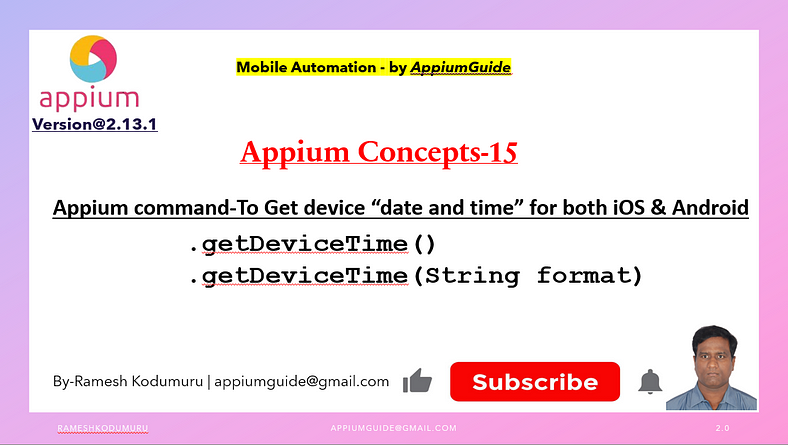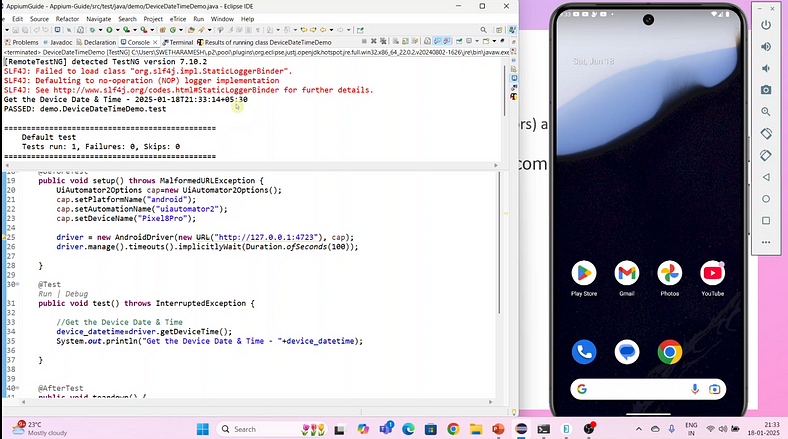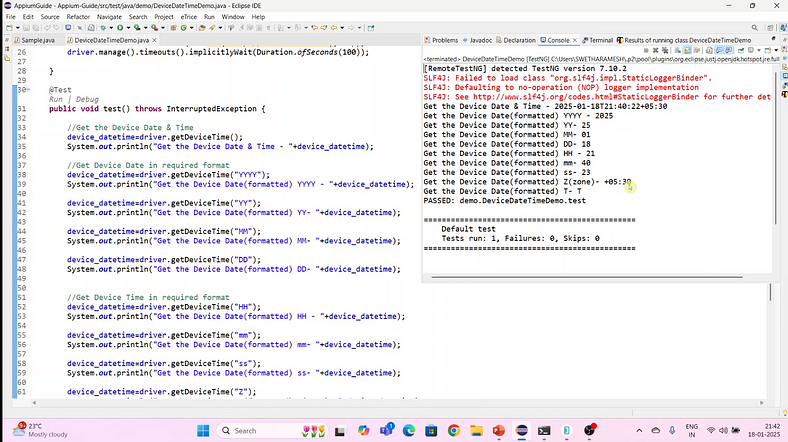Appium Concepts: Appium command-To Get device “date and time” for both iOS & Android
Method :- .getDeviceTime() & .getDeviceTime(String format)

🎥 Check Out the Video Below for Complete Details!
Lets discuss about “.getDeviceTime()” method.
.getDeviceTime() is a method provided by the Appium client libraries that returns the current date and time from the device under test. This is particularly useful for validating time-sensitive operations within a mobile app, such as:
- Checking whether time stamps are displayed correctly
- Validating scheduled actions
- Debugging issues related to system time differences
.getDeviceTime() method
Syntax:
device_datetime=driver.getDeviceTime();Return Value:
.getDeviceTime() typically returns a String that represents the current time on the device. The default format can look like:

You can also pass a format string to specify the desired date/time format (mainly in Java):
.getDeviceTime(String format) method
Syntax:
//Get Device Date in required format
device_datetime=driver.getDeviceTime("YYYY");
System.out.println("Get the Device Date(formatted) YYYY - "+device_datetime);
device_datetime=driver.getDeviceTime("YY");
System.out.println("Get the Device Date(formatted) YY- "+device_datetime);
device_datetime=driver.getDeviceTime("MM");
System.out.println("Get the Device Date(formatted) MM- "+device_datetime);
device_datetime=driver.getDeviceTime("DD");
System.out.println("Get the Device Date(formatted) DD- "+device_datetime);
//Get Device Time in required format
device_datetime=driver.getDeviceTime("HH");
System.out.println("Get the Device Time(formatted) HH - "+device_datetime);
device_datetime=driver.getDeviceTime("mm");
System.out.println("Get the Device Time(formatted) mm- "+device_datetime);
device_datetime=driver.getDeviceTime("ss");
System.out.println("Get the Device Time(formatted) ss- "+device_datetime);
device_datetime=driver.getDeviceTime("Z");
System.out.println("Get the Device Time(formatted) Z(zone)- "+device_datetime);
device_datetime=driver.getDeviceTime("T");
System.out.println("Get the Device Time(formatted) T- "+device_datetime);Output:

Note: The ability to format the time string may depend on the Appium server version and the specific client bindings.
“Complete Code: Optimized and Ready to Use”:
package com.appiumguide.appiumconcepts;
import org.testng.annotations.AfterTest;
import org.testng.annotations.BeforeTest;
import org.testng.annotations.Test;
import io.appium.java_client.android.AndroidDriver;
import io.appium.java_client.android.options.UiAutomator2Options;
import java.net.*;
import java.time.Duration;
/**
* Script Details - Appium Concepts | Appium command-To Get device “date and time” for both iOS & Android
*
* appium-java-client version: 9.3.0
*
* @author 'Ramesh Kodumuru' for AppiumGuide [appiumguide@gmail.com]
*/
public class DeviceDateTimeDemo {
private AndroidDriver driver;
String device_datetime;
@BeforeTest
public void setup() throws MalformedURLException {
UiAutomator2Options cap=new UiAutomator2Options();
cap.setPlatformName("android");
cap.setAutomationName("uiautomator2");
cap.setDeviceName("Pixel8Pro");
driver = new AndroidDriver(new URL("http://127.0.0.1:4723"), cap);
driver.manage().timeouts().implicitlyWait(Duration.ofSeconds(100));
}
@Test
public void test() throws InterruptedException {
//Get the Device Date & Time
device_datetime=driver.getDeviceTime();
System.out.println("Get the Device Date & Time - "+device_datetime);
//Get Device Date in required format
device_datetime=driver.getDeviceTime("YYYY");
System.out.println("Get the Device Date(formatted) YYYY - "+device_datetime);
device_datetime=driver.getDeviceTime("YY");
System.out.println("Get the Device Date(formatted) YY- "+device_datetime);
device_datetime=driver.getDeviceTime("MM");
System.out.println("Get the Device Date(formatted) MM- "+device_datetime);
device_datetime=driver.getDeviceTime("DD");
System.out.println("Get the Device Date(formatted) DD- "+device_datetime);
//Get Device Time in required format
device_datetime=driver.getDeviceTime("HH");
System.out.println("Get the Device Time(formatted) HH - "+device_datetime);
device_datetime=driver.getDeviceTime("mm");
System.out.println("Get the Device Time(formatted) mm- "+device_datetime);
device_datetime=driver.getDeviceTime("ss");
System.out.println("Get the Device Time(formatted) ss- "+device_datetime);
device_datetime=driver.getDeviceTime("Z");
System.out.println("Get the Device Time(formatted) Z(zone)- "+device_datetime);
device_datetime=driver.getDeviceTime("T");
System.out.println("Get the Device Time(formatted) T- "+device_datetime);
}
@AfterTest
public void teardown() {
if(driver!=null) {
driver.quit();
System.out.println("Test Execution Completed");
}
}
}
Supported Platforms
- Android: ✅ Fully supported
- iOS: ✅ Fully supported (though permissions and iOS version may affect results)
Conclusion
The .getDeviceTime() method is a handy utility in Appium for retrieving a device's current time, helping ensure your mobile applications behave correctly in time-sensitive scenarios. Whether you’re debugging a bug or writing a test that depends on system time, this method provides a simple and effective way to stay in sync with your test environment.
Explore on GitHub:

No comments:
Post a Comment